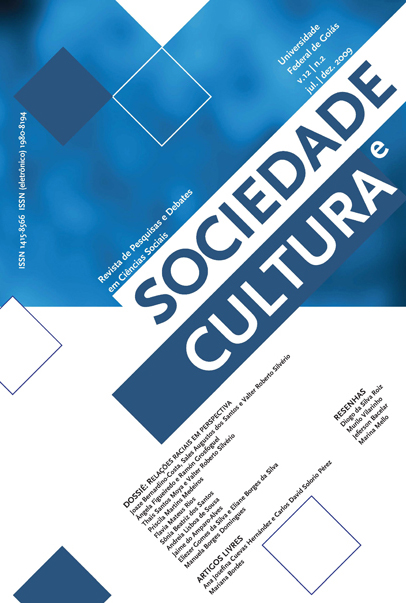Narratives of violence: the white imagiNation and the making of black masculinity in City of God
DOI:
https://doi.org/10.5216/sec.v12i2.9104Palavras-chave:
masculinidade negra, raça, sexualidade, nação, violência urbanaResumo
O artigo explora os regimes de representação de jovens negros no filme Cidade de Deus. O principal argumento é que o filme adota papeis patológicos para os homens negros como criminosos e desviantes para disseminar significados sobre a masculinidade negra no Brasil. O autor sugere que a imagem dominante dos corpos de homens negros como uma fonte de perigo e impureza sustenta a hegemonia racial brasileira; enfim, as narrativas de violência tornam explícitos os modos como a nação brasileira é imaginada pelo viés racial. O duplo vínculo, pelo qual a nação é ambiguamente imaginada também se torna explícito no consumo da negritude como exótica, ao mesmo tempo em que representa uma ameaça à harmonia nacional. A nação é então escrita e re-imaginada como um paraíso racial mesmo/e principalmente inscrevendo-se a morte no corpo negro.Downloads
Não há dados estatísticos.
Downloads
Publicado
2010-03-18
Como Citar
AMPARO-ALVES, JAIME DO. Narratives of violence: the white imagiNation and the making of black masculinity in City of God. Sociedade e Cultura, Goiânia, v. 12, n. 2, p. 301–310, 2010. DOI: 10.5216/sec.v12i2.9104. Disponível em: https://revistas.ufg.br/fcs/article/view/9104. Acesso em: 19 fev. 2026.
Edição
Seção
Dossiê
Licença
Autores/as que publicam nesta revista concordam com os seguintes termos:
- Autores/as mantêm os direitos autorais e concedem à revista o direito de primeira publicação, sendo o trabalho simultaneamente licenciado sob a Creative Commons Attribution License, o que permite o compartilhamento do trabalho com reconhecimento de autoria e da publicação inicial nesta revista.
- Autores/as têm autorização para assumir contratos adicionais separadamente, para distribuição não exclusiva da versão do trabalho publicada nesta revista (ex.: publicar em repositório institucional ou como capítulo de livro), com reconhecimento de autoria e da publicação inicial nesta revista.
- Autores/as têm permissão e são estimulados/as a publicar e a distribuir seu trabalho online (ex.: em repositórios institucionais ou na sua página pessoal) a qualquer ponto antes ou durante o processo editorial, já que isso pode gerar alterações produtivas, bem como aumentar o impacto e a citação do trabalho publicado (veja O Efeito do Acesso Livre).


 Esta revista está licenciada sob a licença
Esta revista está licenciada sob a licença 
